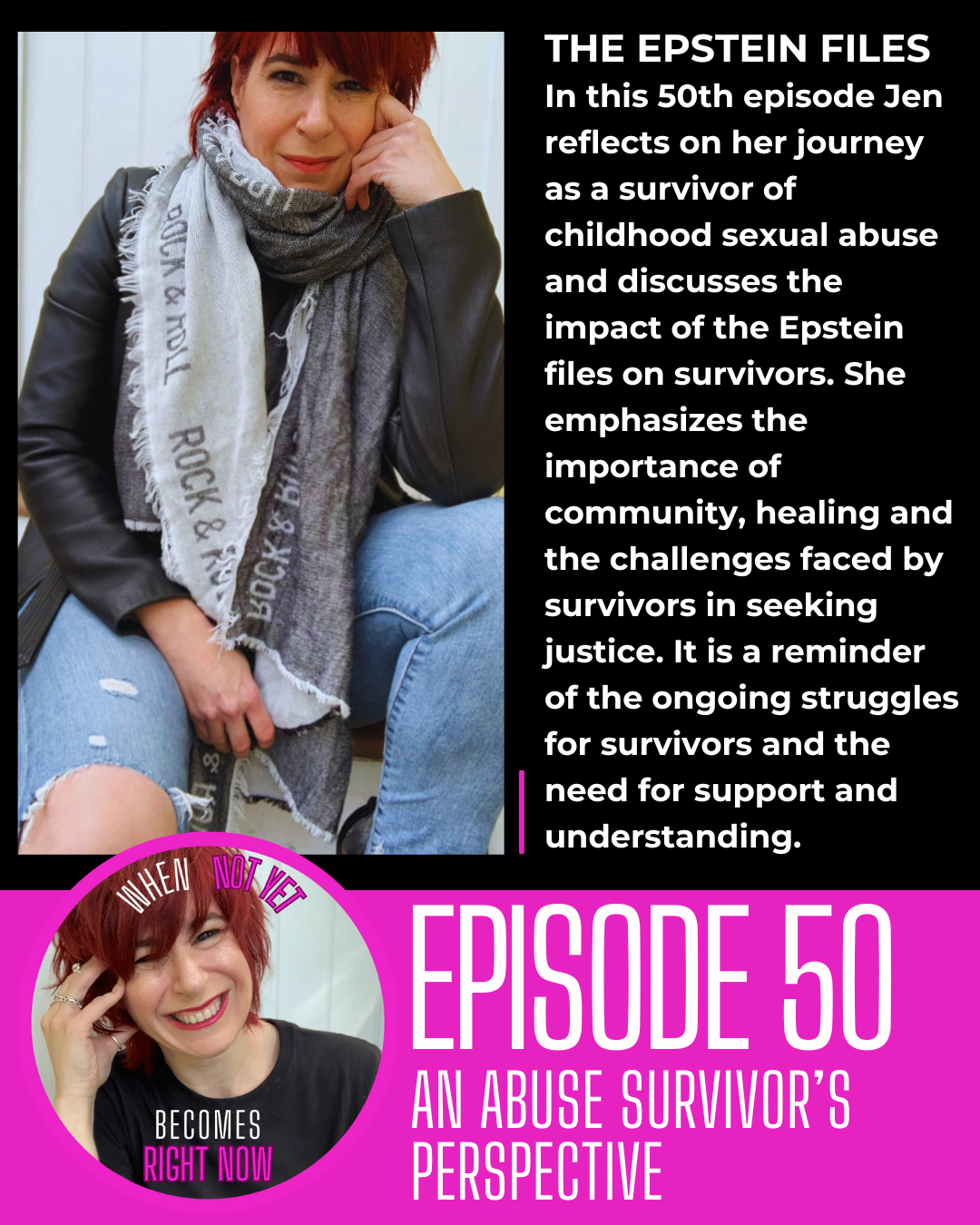Sept. 17, 2025
Trigger Warning: This episode discusses sexual abuse, trauma, and the Epstein Files. Please listen with care.
Welcome to the blog for "When Not Yet Becomes Right Now," the podcast dedicated to exploring the pivotal moments that spark change. For our landmark 50th episode, host Jen Ginty is taking a moment to reflect on a topic that is both deeply personal and painfully public.
As a survivor of childhood abuse who lives with Complex PTSD and Major Depressive Disorder, Jen created this podcast to build a community where people can share their stories and feel less alone. In this powerful episode, she turns her focus to the ongoing impact of the Epstein files, discussing the complex emotions it brings up for survivors and the long, often non-linear, road to healing and justice.
A Survivor's Perspective on Injustice
The release of the Epstein files has a profound impact on survivors of abuse everywhere. For many, it's a stark reminder of how money, power, and influence can be used to shield abusers from accountability. This reality can feel like societal gaslighting, telling survivors that their trauma doesn't matter. The episode confronts this difficult truth, exploring the disbelief and minimization that survivors so often face when they come forward.
Jen understands this journey intimately. For years, she told herself "not yet" when it came to confronting her own trauma, fearing that delving into it would prevent her from functioning as a single mom. It wasn't until a personal crisis — the bankruptcy and closure of her beloved shop — that her brain told her it was "right now". This moment forced her to begin the difficult work of healing, a journey she describes as a "roller coaster" with many ups and downs.
Healing is a Journey, Not a Destination
A central theme of this episode is that healing is a non-linear journey. There is no straight path, but there are tools and support systems that can help.
• Professional Help: Jen is a strong advocate for therapy and is not shy about her own experiences with outpatient and inpatient programs that were crucial to her recovery. The episode encourages survivors to seek out therapy and support groups that can provide essential guidance.
• Finding What Works: Part of Jen's healing involved creating a therapeutic doll called My Moody Monster®, a pull-apart plush monster that helps children (and adults) cope with big frustrations and learn healthy coping skills. This creative outlet became a significant part of her own journey.
• Taking Back Power: By sharing their stories, survivors reclaim their narratives and empower themselves. Jen's podcast is built on the belief that these stories of resilience and growth deserve to be heard and can inspire others on their own paths.
The Power of Community
Community support is crucial for survivors. This is a recurring theme not only in this episode but in the podcast as a whole, which often highlights the importance of support systems. Jen created this platform precisely to build a community and combat the isolation that often accompanies trauma. Hearing stories from others who have navigated similar struggles can make people feel seen, understood, and less alone. This 50th episode is a poignant reminder of that mission, offering a safe space to process the collective trauma brought to light by current events.
--------------------------------------------------------------------------------
Episode Highlights
• [00:00] The 50th Episode and Jen’s Story: Jen reflects on her personal healing journey and the mission behind the podcast.
• [10:10] The Impact of the Epstein Files: A discussion on how these revelations affect survivors and highlight systemic failures.
• [18:54] Healing and Taking Back Power: Exploring the non-linear path of healing and the importance of reclaiming one's story.
• [31:07] Community Support: Emphasizing the vital role community plays in a survivor's recovery process.
Key Takeaways from the Episode
• The Epstein files have a profound impact on survivors.
• Survivors often face disbelief and minimization of their trauma.
• Money and influence can shield abusers from justice.
• Healing is a non-linear journey for survivors.
• Community support can be crucial for survivors.
• Survivors should seek out therapy and support groups.
• Media representation often fails to center survivors' experiences.
• Survivors' stories matter and deserve to be heard.
Resources
If you are struggling, please know you are not alone. Reach out for help.
•
988 Suicide and Crisis Lifeline: A free, confidential resource available 24/7. Jen has noted that this lifeline has helped many people she knows survive through hard times.Connect with Us
Thank you for being a part of this community. Your story matters, your feelings are valid, and you deserve a world that feels safe.

